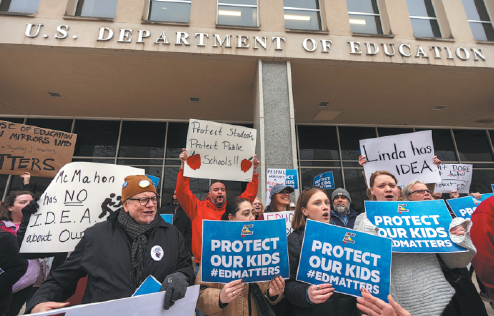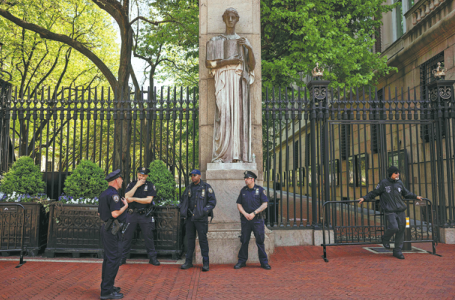Funding cuts shock US colleges

Insiders warn of wasted research, reduced admissions, risks for academic freedom
Gracie Hines, a senior at West Virginia University, was looking forward to working on her PhD in pharmaceutical research at the school this year. She was already admitted.
Then, she got an email that her admission had been rescinded due to federal budget cuts.
"I got my dream taken away from me today," she posted on Facebook on March 3 along with a screenshot of the notification. "I am confused and heartbroken. I have no idea what to do next."
The US higher education system is losing large amounts of federal funding on multiple fronts: programs involving the US Agency for International Development, or USAID; the National Institutes of Health, or NIH; and the diversity, equity and inclusion frameworks, or DEI. Some are losing grants based on alleged antisemitism.
Facing deep cuts and fund freezes by the Trump administration, US colleges and universities are laying off staff, rescinding PhD offers, freezing recruitment and pay raises, restricting business travels, and reducing research and graduate programs.
"The academic model on which the universities relied to conduct their research, to fund their students, to fund postgraduate students — all this is in crisis, because a lot of it, in some way, was funded through federal grants," Aseem Prakash, a political scientist at the University of Washington in Seattle, told the journal Nature. "This is a massive shock."
Overall, US taxpayers fund an estimated $81 billion a year in academic scientific research and development, according to the Organisation for Economic Co-operation and Development.
In mid-March, Johns Hopkins University announced that it was laying off more than 2,200 people and furloughing another 100 on a reduced schedule because of budget cuts — the largest layoff in the institution's history.
A lot of those jobs were funded by USAID and are outside the US. With USAID dismantled by President Donald Trump, Johns Hopkins lost $800 million in funding.
Many funds from NIH and DEI programs were also halted the day Trump took office.
NIH, the largest government research funding agency in the US, issued $35 billion in grants to more than 2,500 medical research institutes in the 2023 fiscal year.
In early February, NIH issued new guidance to cap indirect research costs at 15 percent, down from the average indirect cost rate of 27 to 28 percent. That means a total reduction of $4 billion in funding.
In the first two months of the Trump administration, more than 300 NIH grants were terminated and $1.5 billion in funding delayed, Monica Bertagnolli, former director of NIH under the Biden administration, said at a recent forum organized by Senator Tammy Baldwin, a Democrat from Wisconsin.
She said that NIH-funded advances have contributed to reductions in death rates from cancer, heart attacks and strokes in the US. With projects being canceled midstream, years of research data would likely be wasted and the role of the NIH as the world's leading funder of biomedical research was at risk.
Whitney Wharton, an Alzheimer's researcher at Emory University, said: "These cuts are very, very devastating and they're very scary for young investigators, for students, whether they've been affected or not. These young scientists may leave research altogether because they're nervous."
Major consequences
It might be happening already.
"I hear anecdotally now all the time of people who are not coming to the US as international students because of fears," Lee Bollinger, Columbia's president emeritus, told CNN. "There is evidence of this in schools where applications are down considerably from various countries, with major consequences for the financial bottom line of various schools and departments, but also for the richness of our educational system."
Trump has also scrapped DEI programs that provided funding for scholarships and housing to groups who have historically been underrepresented or discriminated against. The federal government not only cut more than $350 million in related grants but also cut some schools' funding over DEI policies.
On March 25, the University of Pennsylvania stopped receiving $175 million federal funding after it allowed a transgender woman to compete in sports. A spokesperson said the university does not have a specific policy for transgender athletes and follows NCAA and Ivy League conference guidance.
The university also faces another potential $240 million cut if NIH moves forward with a newly capped indirect cost rate of 15 percent. It has decided to significantly reduce graduate admission rates.
Some universities have lost funding due to student protests over Israel's campaign in Gaza, which the Trump administration called "antisemitism". The federal government recently canceled $400 million in grants and contracts with the Columbia University over the issue.
About 60 universities are under civil rights investigation for potential "antisemitic discrimination and harassment", including Harvard, Yale, Princeton, Arizona State and Ohio State.
Columbia officials have bowed to the government's demands, agreeing to hire more police officers and give them more power to arrest students; ban face masks except for religious or medical reasons; adopt an updated definition of antisemitism and appoint a new senior vice provost to oversee its Center for Palestine Studies and the departments of Middle East, South Asian and African studies.
However, Columbia's concession is only a "precondition for formal negotiations" to continue its "financial relationship with the US government," the government said in its letter to the school.
While the federal government called Columbia's concession a "positive first step", labor unions representing professors and other educators sued the Trump administration over the $400 million cancellation last week, accusing the White House of leveraging the funds to interfere with free speech and academic independence.
"This action challenges the Trump administration's unlawful and unprecedented effort to overpower a university's academic autonomy and control the thought, association, scholarship and expression of its faculty and students," said the lawsuit filed jointly by the American Association of University Professors and the American Federation of Teachers.
"We're seeing university leadership across the country failing to take any action to counter the Trump administration's unlawful assault on academic freedom," Reinhold Martin, a Columbia professor of architecture, said in a news release.
There have been multiple lawsuits in the courts over academic funding freezes from NIH and other federal agencies.
Universities face funding losses not only at the federal level but also at the state level. In Texas, when both the House and the Senate unveiled their state budget proposals a month ago, both included an item eliminating the institutional enhancement fund that provided $423 million to universities in the last budget cycle.
Agencies contributed to the story.
mayzhou@chinadailyusa.com























